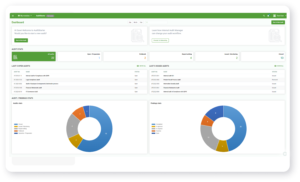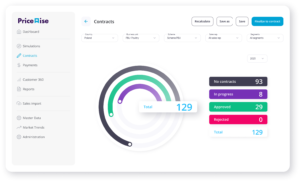- 1. When it comes to rebate accounting, many businesses continue to rely on spreadsheets as their go-to tool. However, it’s crucial to acknowledge the numerous drawbacks associated with using spreadsheets for rebate accounting. Depending solely on spreadsheets poses risks to the efficiency of your rebate management process and can impede your business’s financial health. To overcome these challenges, it’s time to shift away from Excel and embrace advanced rebate management software. By making this transition, you can streamline processes, enhance accuracy, and optimize your business’s overall rebate performance.
- 2. Spreadsheets for Rebate Accounting: Limited and Vulnerable
- 3. Excel + much more
When it comes to rebate accounting, many businesses continue to rely on spreadsheets as their go-to tool. However, it’s crucial to acknowledge the numerous drawbacks associated with using spreadsheets for rebate accounting. Depending solely on spreadsheets poses risks to the efficiency of your rebate management process and can impede your business’s financial health. To overcome these challenges, it’s time to shift away from Excel and embrace advanced rebate management software. By making this transition, you can streamline processes, enhance accuracy, and optimize your business’s overall rebate performance.
Companies have long relied on Excel spreadsheets for rebate accounting due to their affordability, familiar interface, and integration capabilities. Excel provides finance and accounting teams with the ability to manipulate data effortlessly and explore different scenarios without impacting actual figures. It serves as a practical solution for managing rebates, particularly when dealing with intricate calculations that may prove challenging for conventional accounting systems. Moreover, the retrospective nature of rebate management, where deals are finalized in one period but paid in another, presents difficulties for enterprise-level accounting systems. Excel’s flexibility allows companies to effectively handle these complexities and adapt to evolving rebate structures.
Despite the potential risks involved in relying on spreadsheets for managing substantial rebate transactions, their convenience, familiarity, and ability to handle intricate rebate structures have made them a go-to tool for many businesses.
Spreadsheets for Rebate Accounting: Limited and Vulnerable
Excel spreadsheet errors have had significant consequences for businesses in the past, leading to well-known corporate catastrophes and billions of dollars in losses. In 2011, AstraZeneca unintentionally disclosed confidential information when an Excel template error resulted in the inclusion of sensitive data in financial guidance reports sent to analysts. This breach of confidentiality resulted in legal and financial repercussions. Similarly, during the London 2012 Summer Olympics, a simple Excel typo led to overselling tickets for a synchronized swimming event, causing embarrassment and necessitating remedial measures for ticket-holders. Additionally, in the infamous case of J.P. Morgan’s London Whale incident in 2012, a $6 billion trading loss occurred due to an Excel copy-and-paste error.
While Excel is a valuable tool, it is not always the optimal solution. Relying solely on spreadsheets for rebate accounting exposes companies to significant risks and disadvantages, including human errors, limited collaboration features, scalability issues, lack of transparency, time-consuming manual processes, absence of real-time insights, data security vulnerabilities, and reporting limitations.
Excel + much more
To mitigate these risks and ensure effective rebate management, companies should consider adopting solutions that offer much more than Excel: automation, scalability, collaboration capabilities, data security, real-time insights, and comprehensive reporting.
By incorporating these features, modern rebate management solutions combine the advantages of Excel, such as data manipulation, integration, and user-friendliness, with additional benefits that address the limitations of spreadsheets:
User-Friendly Interface
Like Excel, modern rebate management solutions often provide a familiar and intuitive interface, making it easy for users to transition from spreadsheets.
Data Manipulation and What-If Scenarios
These solutions allow users to manipulate data and perform “what-if” analyses, similarly to what can be done in Excel. Users can explore different scenarios without affecting real numbers, enabling better decision-making.
Integration Capabilities
Modern rebate management solutions often integrate with other business tools, such as ERP systems, CRM platforms, or data analytics software. This integration ensures seamless data flow and enhances overall efficiency.
Collaboration Features
Unlike spreadsheets, modern rebate management solutions offer robust collaboration capabilities. Multiple users can work simultaneously on rebate-related tasks, with version control mechanisms to track changes and maintain data integrity.
Scalability
These solutions are designed to handle large volumes of rebate transactions and accommodate complex rebate structures. They can scale with your business’s growth, ensuring the efficient management of increasing rebate programs and suppliers.
Advanced Automation
Modern rebate management solutions automate manual tasks, such as data entry, calculations, and reporting. This automation reduces errors, saves time, and improves overall efficiency, freeing up resources for more strategic activities.
Comprehensive Reporting and Analytics
Much like Excel, modern solutions provide powerful reporting and analytics features. Users can access real-time insights, graphical representations, and customizable reports, facilitating data-driven decision-making and a deeper understanding of rebate effectiveness.
Data Security
Modern rebate management solutions prioritize data security. They offer secure cloud storage, robust access controls, and encryption mechanisms to protect sensitive rebate data against loss, unauthorized access, and compliance risks.
Data Quality
Managing a loyalty program’s rebates must include a focus on data quality, specifically considering data collection and validation, the integration of data sources, and data cleansing and enrichment mechanisms.
Let’s remember that rebate management is not just about numbers and calculating rebate amounts for loyal customers. In addition to rebate calculation functionalities, modern rebate management tools encompass various features that support the processes of customer recruitment, contract management, and holistic program management. These functionalities include creating simulations of rebate program participation benefits and personalized contract proposals, a system for document circulation and storage, as well as facilitating quick rebate approval, generating comprehensive reports, and ensuring timely rebate payments.
With these additional functionalities, modern rebate management tools offer a comprehensive solution for businesses to effectively manage rebate programs. From attracting customers with tailored contract proposals to efficiently managing contracts, programs, and rebate payments, these tools provide a holistic approach to rebate management, optimizing the overall rebate experience for both businesses and customers. By leveraging the benefits of accuracy, automation, scalability, enhanced visibility, and time savings offered by modern software, you can optimize your rebate management and achieve sustainable growth.
There is another noteworthy characteristic of rebate solutions that is often overlooked in the market. It revolves around the ability to swiftly adapt the rebate solution to the dynamic business landscape across various domains, empowering you to keep pace with a flexible and agile pricing strategy. This is precisely why our Pricewise solution stands out in terms of maintaining the flexibility of Excel. It harnesses cutting-edge low-code technology, enabling rapid implementation of essential changes and seamless scalability.
Don’t let spreadsheets hinder your business’s potential. Upgrade to rebate accounting software today and pave the way for seamless and error-free rebate accounting.
- Check out our case study to see this in practice.
- Visit the Pricewise website to explore how you can upgrade your rebate policy and your loyalty program’s overall performance.
Would you like more information about this topic?
Complete the form below.


